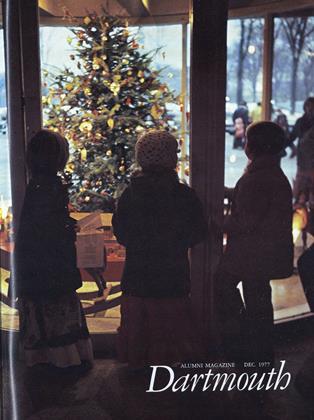THE ANATOMYOF HISTORICAL KNOWLEDGEBy Maurice Mandelbaum ’29Johns Hopkins, 1977. 230 pp. $12.95
Are historical accounts objective or merely the subjective interpretations of biased historians? Does history, like the sciences, rest on universal laws that explain events, or does it simply describe the unique? Is history a distinct discipline or merely the name applied to all accounts of the past? Former Dartmouth professor Maurice Mandelbaum, in TheAnatomy of Historical Knowledge, grapples with these questions and does so with good sense, perspicacity, and originality.
His good sense is evident in his awareness that for all their biases historians provide accounts that are significantly objective. Mandelbaum knows historians make contradictory statements, but he also knows that evidence often exists that can show one statement more nearly correct than another. The statements can be checked against “meaningful evidence,” evidence which has an order inherent in it. Furthermore, its “accumulation and sifting” has led to a growing agreement about the past. Mandelbaum’s rejection of a shallow relativism is refreshing.
Equally welcome is his discussion of general laws in explaining historical events. In 1942, Carl Hempel said that to explain an event is to subsume it under a general law. We. know that frozen water bursts radiators because it in- variably does so, and we know that rising social classes and inept monarchies cause revolutions because they invariably do so. To this W. H. Dray, in 1964, said nonsense! The cause of events, he argued, lies in a particular series of in- cidents that makes up a unique event: a radiator bursts because a particular can of anti-freeze was mislabeled, or a revolution occurs because of a particularly stupid king. Combining the best insights of Hempel and Dray, Mandelbaum argues that “law-like generalizations” (water freezing at 32° and rising classes clashing with inept kings) can be useful aids in explaining par- ticular events, but that events, whether a political election or a revolution, are an “ongo- ing process, a series of occurrences terminating in a specific event.” Explanation in history is a description of those complex occurrences and not the discovery of mechanical causes and effects like so many colliding billiard balls. Though some law-like generalizations can throw light on some of the connections tying together the whole, a full explanation can only come from describing the entire event.
In analyzing historical explanation Mandelbaum displays a genius at making dis- criminations and at disentangling complex problems into their distinct parts. This same genius works less well in his argument that general histories differ from special histories. Historians will read with interest the argument that general histories deal with whole societies and so with structures; that special histories deal with cultural artifacts (like technologies and ideas) and so with influences; that their respec- tive modes of explanation are therefore radically different; but that when historians actually write special history their mode of thought will differ little from that employed when they write general history. In any case whoever reads TheAnatomy of Historical Knowledge will on almost every count be wiser about the meaning of history.
Professor Roberts has taught the“Historiography and Problems of History"course at Dartmouth for 20 years.Mandelbaum’s earlier book Problems of Historical Knowledge, he says, "gave me goodarguments for saving Dartmouth students fromthe pitfalls of relativism."
 View Full Issue
View Full Issue
More From This Issue
-
 Feature
FeatureA Story: His Grandmother and Vincent
December | January 1977 By Howard Webber -
 Feature
FeatureThe Well-Tempered Synclavier
December | January 1977 By Woody Rothe -
 Feature
FeatureReflections on an $8-million post office The Hopkins Revolution
December | January 1977 By Henry B. Williams -
 Article
ArticleResident Rotiferologist
December | January 1977 By S.G. -
 Class Notes
Class Notes1971
December | January 1977 By THOMAS G. JACKSON -
 Sports
SportsThe Coach Departs
December | January 1977 By Brad Hills ’65
Books
-
 Books
BooksFACULTY PUBLICATIONS
June, 1915 -
 Books
BooksAlumni Publications
March 1934 -
 Books
BooksFRATERNITY VILLAGE,
October 1949 By Herbert F. West '22 -
 Books
BooksALL THE BEST IN CENTRAL AMERICA:
June 1946 By J. M. Arce -
 Books
BooksTHE COLLEGE LIBRARY BUILDING
November 1932 By N.L.Goodrich -
 Books
BooksMASSACHUSETTS PROCEDURAL FORMS, ANNOTATED.
APRIL 1965 By W. LANGDON POWERS '34

